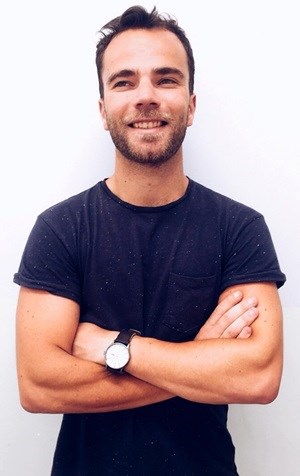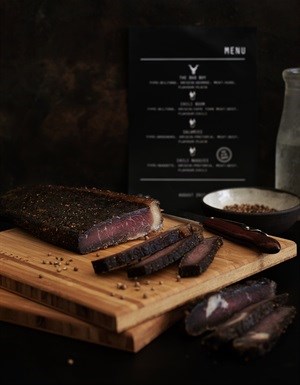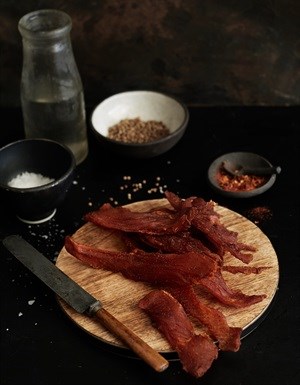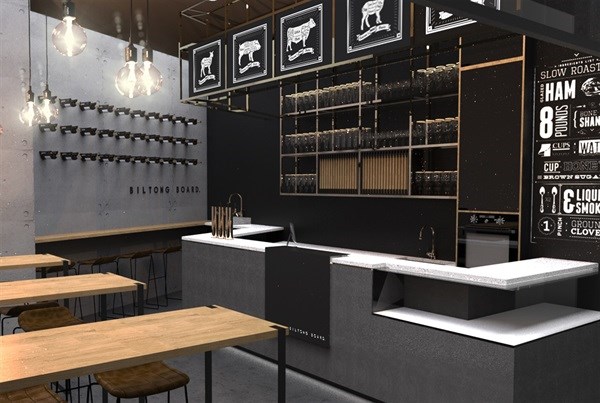
A serial entrepreneur, French-born Eon narrowed his focus on South Africa’s favourite snack after stumbling upon the reality that a few large manufacturers were controlling the industry, and the biltong they were supplying to generic retail stores and supermarkets was often overpriced and of an inferior quality.
“One Sunday afternoon I went to a market and tasted biltong from a farmer. It was delicious and I didn’t understand why biltong of that quality wasn’t available on a larger scale. When I did my research, I discovered that the industry was owned by a few market players – so while you may find three brands of biltong on the shelf, they’re probably owned by the same company.”
The big players, Eon says, are so rooted in the market that it’s nearly impossible for small producers to gain a foothold. “Many of these farmers also lack the business sense and resources to go up against the big guys, which makes it hard for biltong lovers to gain access to quality product.”
Biltong Board was born to bridge this gap. Launched as a subscription box service, it offered a selection of organic, MSG-free, ethically-sourced biltong from over 70 producers nationwide. Customers could sign up for one, three or six months and get a curated selection of biltong based on a menu that changed on a monthly basis delivered regularly to their door.
The subscription service drew considerable interest, but Eon says the model was a barrier to entry due to the upfront cost involved. People were not necessarily prepared to order a full box at a time.
“I think subscription models are appealing to entrepreneurs because they’re a good way to test the market due to startup costs and the risks involved being low. It enabled us to build great exposure for our brand.
“That said, I do believe the subscription business model is oversold. In South Africa, we play in a very niche market; subscriptions are often a luxury so you have to target customers that are willing to pay more than what they would in the store and that are keen to buy into the convenience of it. Therefore, I would recommend thinking twice. Subscription remains our biggest ambassador but is not at all our biggest source of income.”
This realisation led to a relaunch of the website. This time the focus was less on the subscription element, and instead offered customers the freedom to order product according to their preference and budget. It also boasted a new payments system using debit orders to avoid customers having to pay upfront.
Especially exciting was the introduction of a new biltong range developed by Eon and supplier-turned-business-partner Sarel Van der Walt. The new selection comprised over 30 types of biltong, including game like gemsbok and eland, and gourmet varieties like beef fillet and waygu beef.
“We both knew that the industry is a lot bigger than we expected, but it’s also conservative. Our idea was to come up with new recipes that move away from what has been done for the last hundred years and offer something fresh and modern.


Despite Biltong Board’s online success, Eon says he knew that buying biltong online was not for everybody.
“Online is fantastic, especially for reach, but it can be impersonal. People don’t necessarily want to interact with a computer to buy biltong especially when they’re used to shopping for it at a butcher or market. Also, we are in South Africa where people are not all computer or internet savvy and they think twice before leaving credit card details online.”
Eon and Van der Walt realised that for Biltong Board to become what they had planned for it, the company needed to have an offline brand presence as well. They took it to key markets in Cape Town to gain direct customer feedback.
“Essentially, we were extending what Biltong Board is about online – strong customer experience, strong service and quality product – and testing it in the offline market.”
The positive response gained from the experience gave Eon the confidence for his next venture – a physical store.
The physical iteration of Biltong Board will appear in the form of a modern, sidewalk eatery and bar that will showcase the company’s extensive variety of biltong alongside a range of local craft beers and wines.

The store will open close to November and will be located in the heart of the Cape Town city centre on the corner of Bloem and Loop Street. The owners aim to differentiate the offering by establishing the store in an urban area, while traditional biltong sales are done in farmstalls and supermarkets.
There’s no denying the tourism potential of the venture, but Eon insists he doesn’t want it to be seen as just a tourist spot. “After work people will be able to visit and have some biltong nibbles paired with a glass of wine or beer,” he says of his vision.
No cost is being spared when it comes to the shopfittings, which will see the inclusion of brass, concrete, French oak tables and a fully activated biltong display. According to Eon, he wants the space to make customers say ‘wow’.
“It’s going to be a statement shop. A full-on customer-focused experience. We are spending a lot of resources on it because we want to show people that we are refreshing the image of biltong.”

Eon believes Biltong Board is ushering in a state of flux in the biltong business.
“The industry is very focused on the actual product. I often compare the biltong industry to the coffee industry ten years ago. There used to be one major coffee franchise in South Africa, but then smaller brands emerged, like Deluxe and Truth, and they understood that coffee was more than a product, it was a routine. They understood the importance of the experience to the customer. We want to be to the biltong industry what some of these guys have been to the coffee industry. It's all about providing a unique experience.”
Hungry for more? Shop Biltong Board online and connect with the brand on Facebook, Instagram and Twitter.
